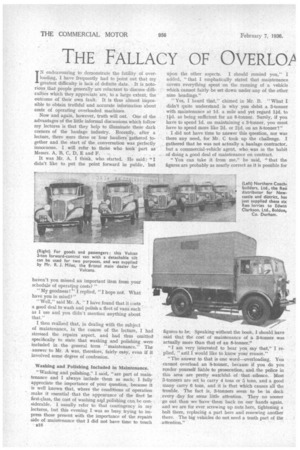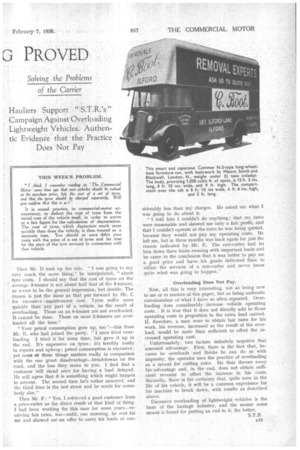THE FALLACY OF OVERL01 6
Page 124

Page 125

If you've noticed an error in this article please click here to report it so we can fix it.
0 PROVED
IN endeavouring to demonstrate the futility of overloading, I have frequently had to Point out that my greatest difficulty is lack of definite data. It is notorious that people generally are reluctant to discuss difficulties which they appreciate are, to a large extent, the outcome of their own fault. It is thus almost impossible to obtain truthful and accurate information -about costs of operating overloaded machines.
Now and again, however, truth will out. One of the advantages of the little informal discussions which follow my lectures is that they help to illuminate these dark corners of the haulage industry. Recently, after a lecture, there were three or four hauliersgathered together and the start of the conversation was perfectly innocuous. I will refer to those who took part as Messrs. A, B, C, D, E and F.
It was Mr. A, I think, who started. He said: "I didn't like to put the point forward in public, but haven't you missed an important item from your schedule of operating costs?"
" My goodness ! " I replied, "I hope not. What have you in mind?"
"Well," said Mr. A, " / have found that it costs a good deal to wash and polish a fleet of vans such as I use and you didn't mention anything about that."
I then realized that, in dealing with the subject of maintenance, in the course of the lecture, I had stressed the repairs aspect, and had thus omitted specifically to state that washing and polishing were included in the general term "maintenance." The answer to Mr. A was, therefore, fairly easy, even if it involved some degree of confession.
Washing and Polishing Included in Maintenance.
"Washing and polishing," I said, "are part of maintenance and I always include them as such; I fully appreciate the importance of your question, because it is well known that, where the conditions of operation make it essential that the appearance of the fleet be first-class, the cost of washing art(' polishing can, be considerable. I usually refer to that contingency in my lectures, but this evening I was so busy trying to impress those present with the importance of the repairs side of maintenance that I did not have time to touch
B18 upon the other aspects. I should remind you," I added, 'that I emphatically stated that maintenance covers everything spent on the running of a vehicle which cannot fairly be set down under any of the other nine headings."
"Yes, I heard that," chimed in Mr. B. "What I didn't quite understand is why you debit a 3-tonner with maintenance at 1d. a mile and yet regard lid. to lid. as being sufficient for an 8-tonner. Surely, if you have to spend id. on maintaining a 3-tonner, you must have to spend more like 2d. or 24d. on an 8-tonner?"
I did not have time to answer this question, nor was there any need, for Mr. C took up the challenge. I gathered that he was not actually a haulage contractor, but a commercial-vehicle agent, who was in the habit of doing a good deal of maintenance on contract. "You can take it from me," he said, "that the figures are probably as nearly correct as it is possible for figures to be. Speaking without the book, I should have said that the cost of maintenance of a 3-tonner was actually more than that of an 8-tonner."
"I am very interested to hear you say that," I replied, "arid I Would like to know your reason."
"The answer to that is one word—overloading. You cannot overload an 8-tonner, because if you do you render yourself liable to prosecution, and the police in this area are pretty watchful of that offence. Most 3-tonners are set to carry 4 tons or u tons, and a good many carry 6 tons, and it is that which causes all the trouble. The fact is, 3-tonners seem to be in dock . every day for some little attention. They no sooner go out than we have • them back on our hands again, and we are for ever screwing up nuts here, tightening a bolt there, replacing a part here and renewing another there. The big vehicles do not need a tenth part of the attention."
Then Mr. D took up the tale. I was going to say
very much the same thing," he interpolated, "about tyre costs. I should say that the cost of tyres on the average 3-tonner is not about half that of the 8-tonner, as seems to be the general impression, but double. The reason is just the same as that put forward by Mr. C for excessive• maintenance cost. Tyres suffer more quickly than any part of a vehicle, as the result of overloading. Those on an 8-tonner are not overloaded. It cannot be done. Those on most 3-tonners are overloaded all the time."
Your petrol consumption goes up, too "—this from Mr. E, who had joined the party. "I once tried overloading. I tried it for Some time, but gave it up in the end. It's expensive on tyres ; it's terribly costly in repairs and upkeep; petrol consumption is excessive ; yet none of these things matters really in comparison with the one great disadvantage—breakdowns on the road, and the loss they mean to you. I find that a customer will stand once for having a load. delayed. He will agree that it is something which might happen to anyone. The second time .he's rather annoyed, and the third time is the last straw and he sends for somebody else."
Then Mr. F: "Yes, I retrieved a good customer from a price-cutter as the direct result of that kind of thing. I had been working for this man for some years—receiving fair rates, too—until, one morning, he sent for me and 'showed me an offer to carry his loads at con
siderably less than my charges. He asked me what I
was going to do about it.
"I told him I couldn't do anything; that my rates were reasonable and showed me only a fair profit, and that I couldn't operate at the rates he was being quoted, because they would not pay my operating costs. He left me, but in three months was back again for just the• reason indicated by Mr, E. The rate-cutter had let him down three times running with important loads and
he came to the conclusion that it was better to pay me a good price and have his goods delivered than to utilize the services of a rate-cutter and never know quite what was going to happen."
Overloading Does Not Pay.
Now, all this is very interesting, not as being new to me or to readers of this paper, but as being authentic corroboration of what I have so often repeated. Overloading does considerably increase vehicle operating costs. It is true that it does not directly add to those operating costs in proportion to the extra load carried. If, therefore, a man were to *obtain fair rates for his work, his revenue, increased as the result of the overload, would be more than sufficient to offset the in creased operating cost.
, Unfortunately, two factors definitely negative that assumed advantage. First, there is the fact that, because he overloads and thinks he can do so with impunity, the operator uses the practice of overloading as a means for cutting rates. He thus throws away his advantage and, in the end, does not obtain sufficient revenue to offset the increase in his costs. Secondly, there is the certainty that, quite soon in the life of his vehicle, it will be a common experience for his machine to break down, with results as described above.
Excessive overloading of lightweight vehicles is the bane of the haulage industry, and the sooner some means is found for putting an end to it, the better.
S.T.R.




































































































































































